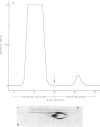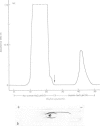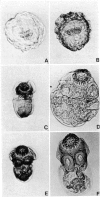Abstract
The presence of host serum proteins, including IgG and IgM, within the cyst membranes and on the surface of protoscoleces of Echinococcus multilocularis was demonstrated by the use of HRPO-conjugated purified antisera. Viable protoscoleces incubated either in EDTA- or EGTA-fresh human sera were not lysed; the addition of calcium restored the protoscolecidal activity of the EGTA serum. It is concluded that the complement-mediated lysis of this metazoan organism proceeds via the classical pathway of complement activation. The results are discussed in relation to the ability of this parasite to survive in the immunologically hostile environment of the host.
Full text
PDF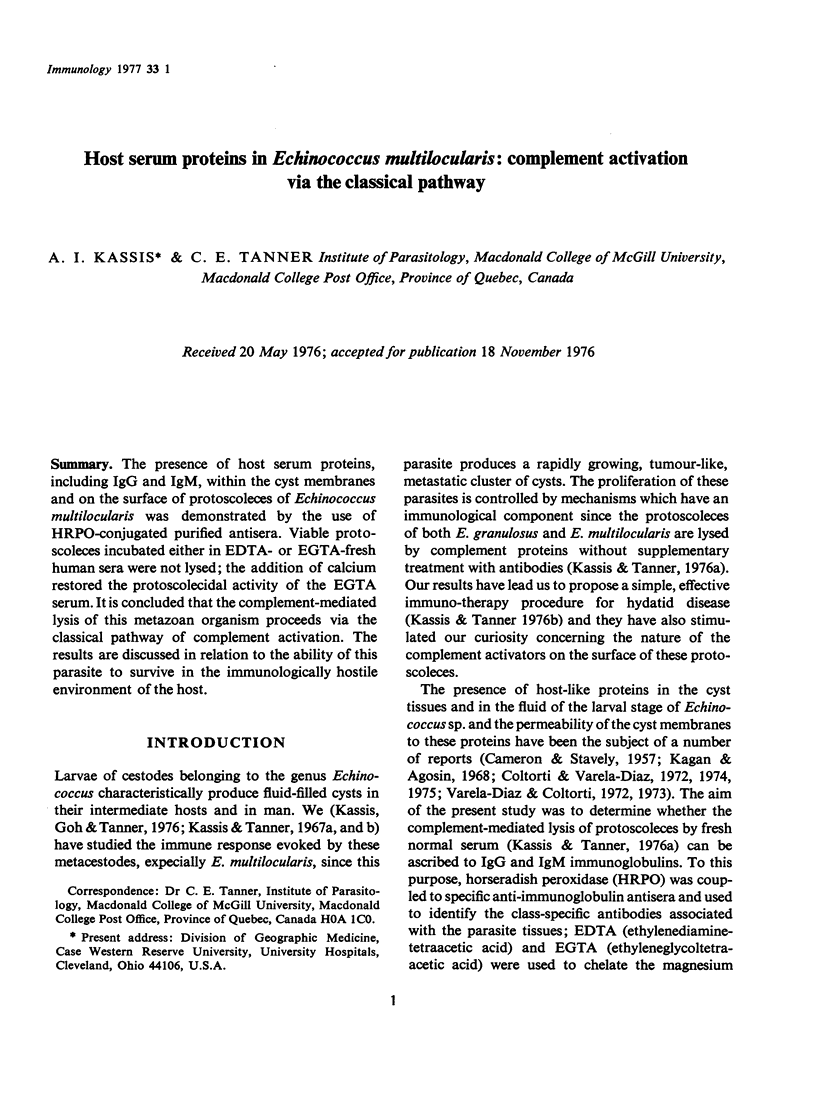
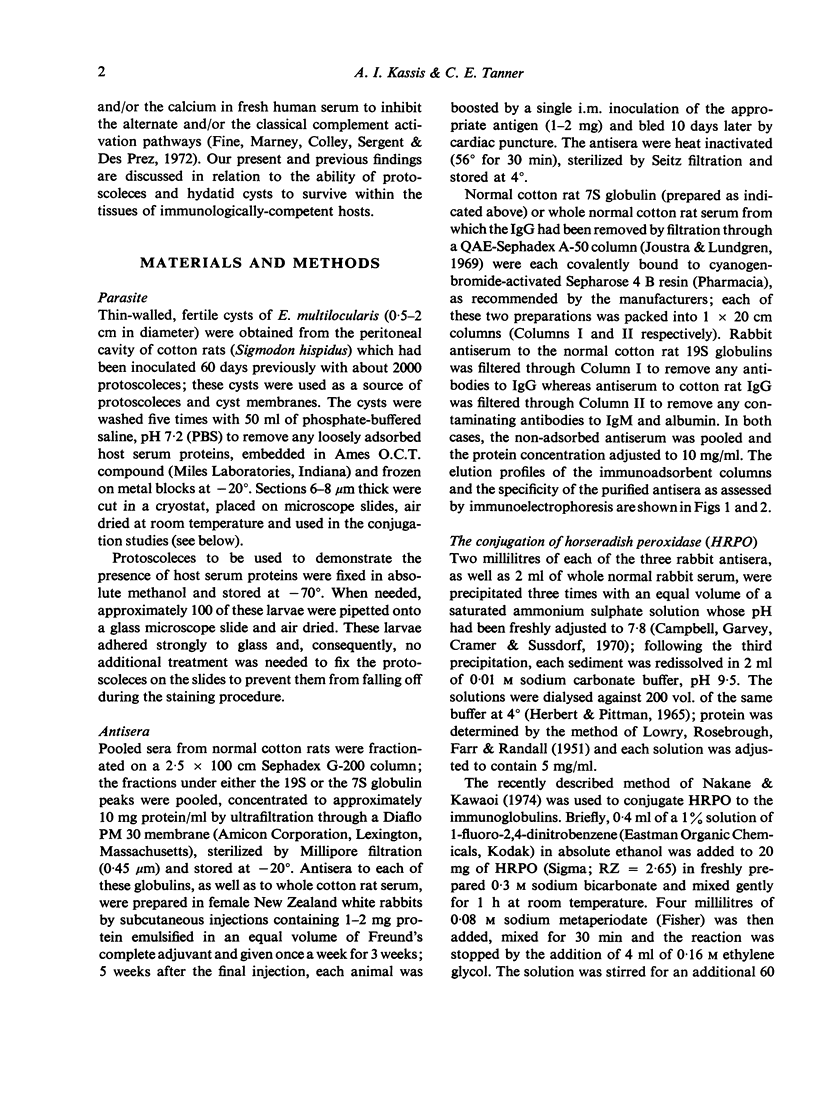
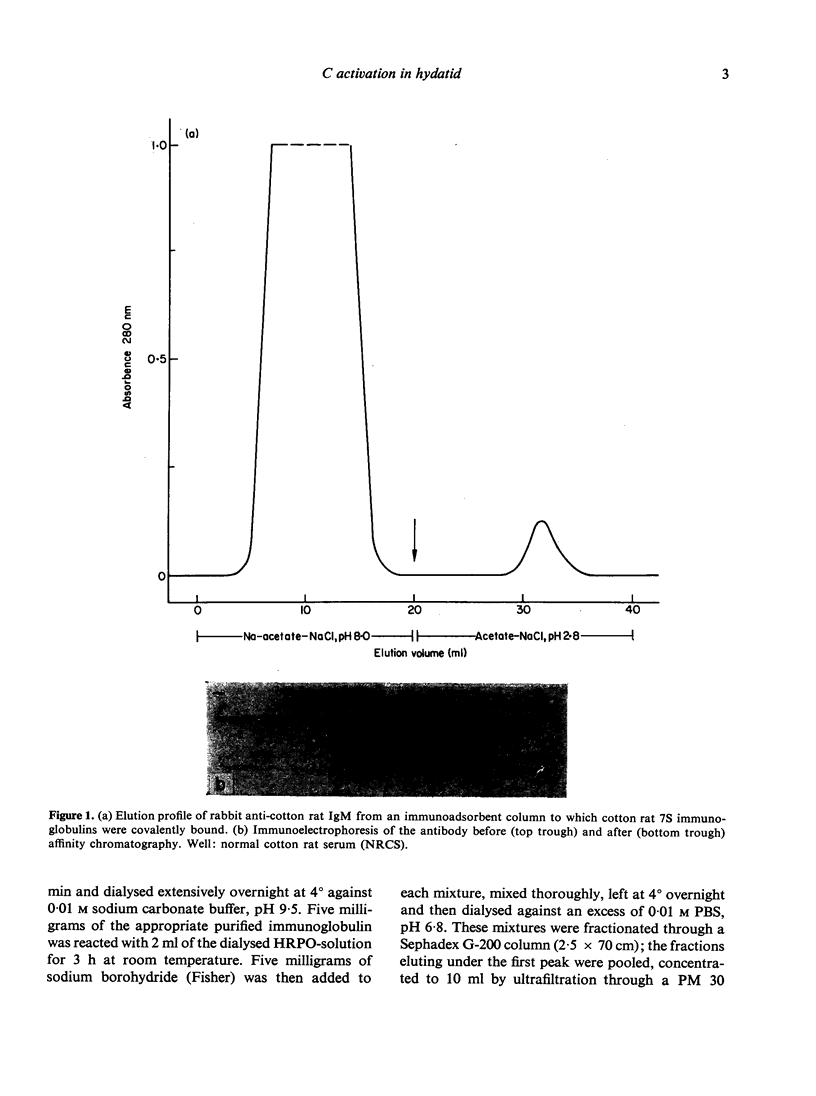
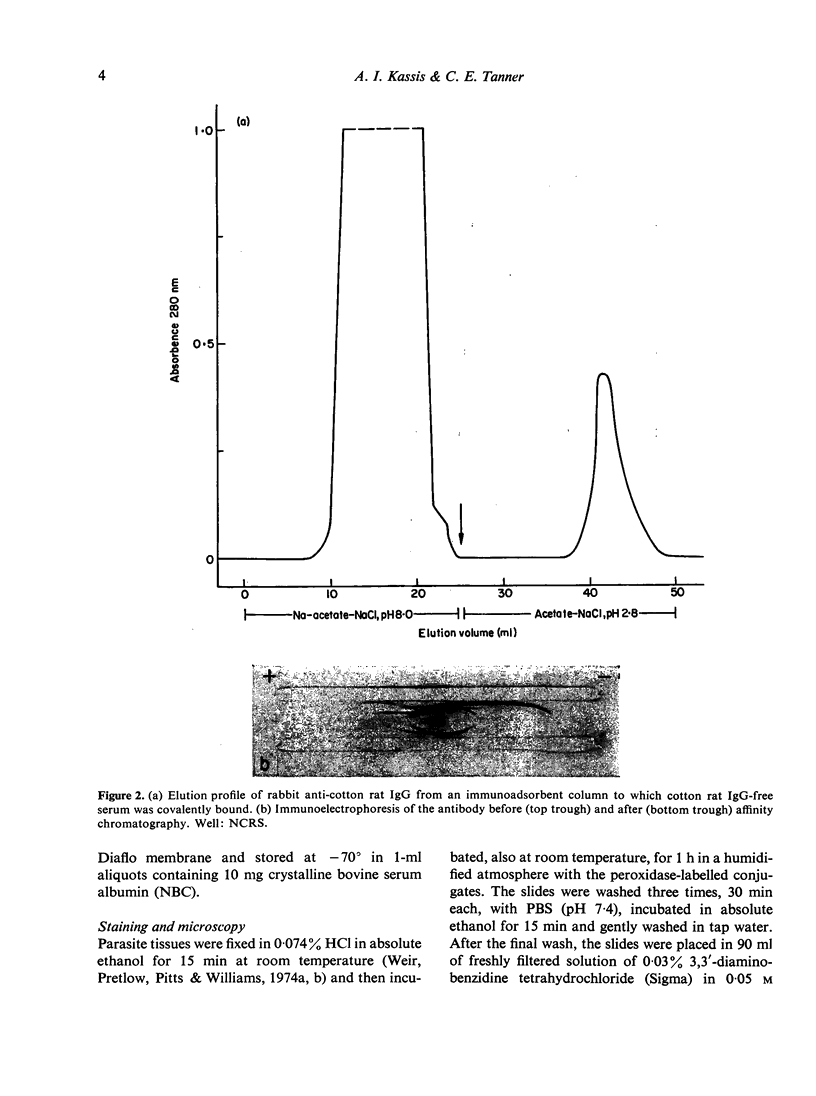
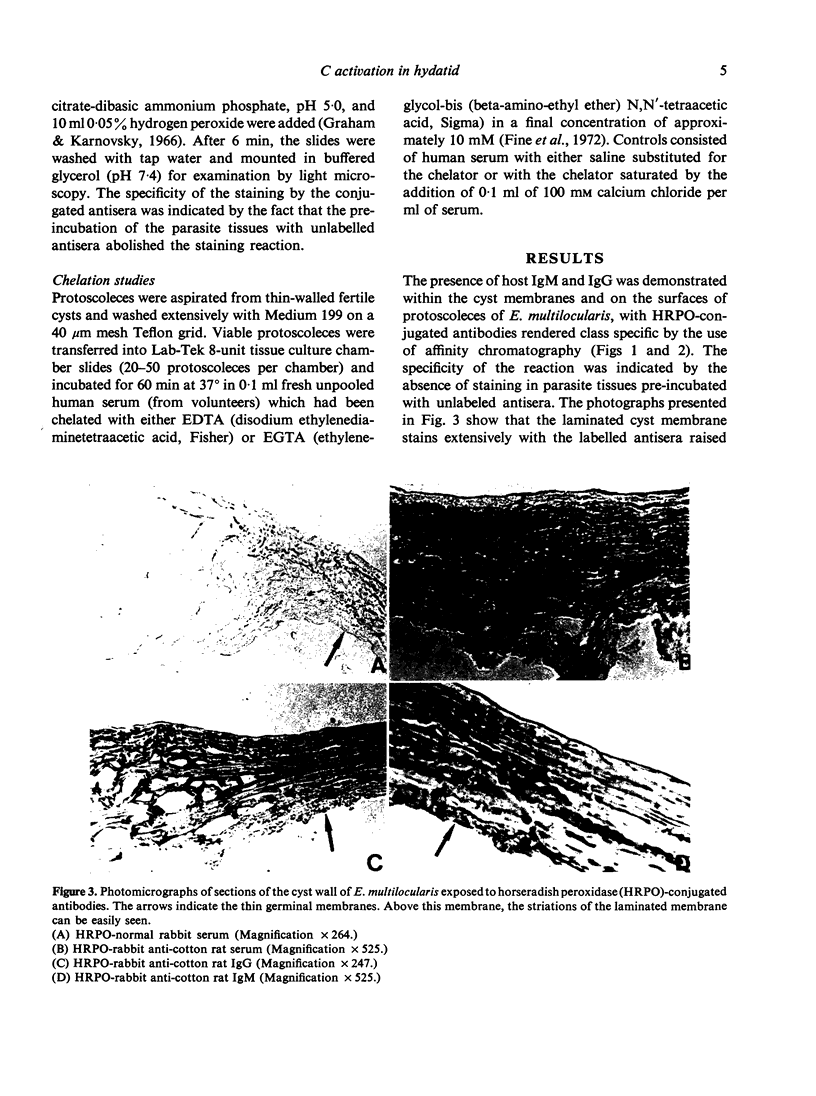
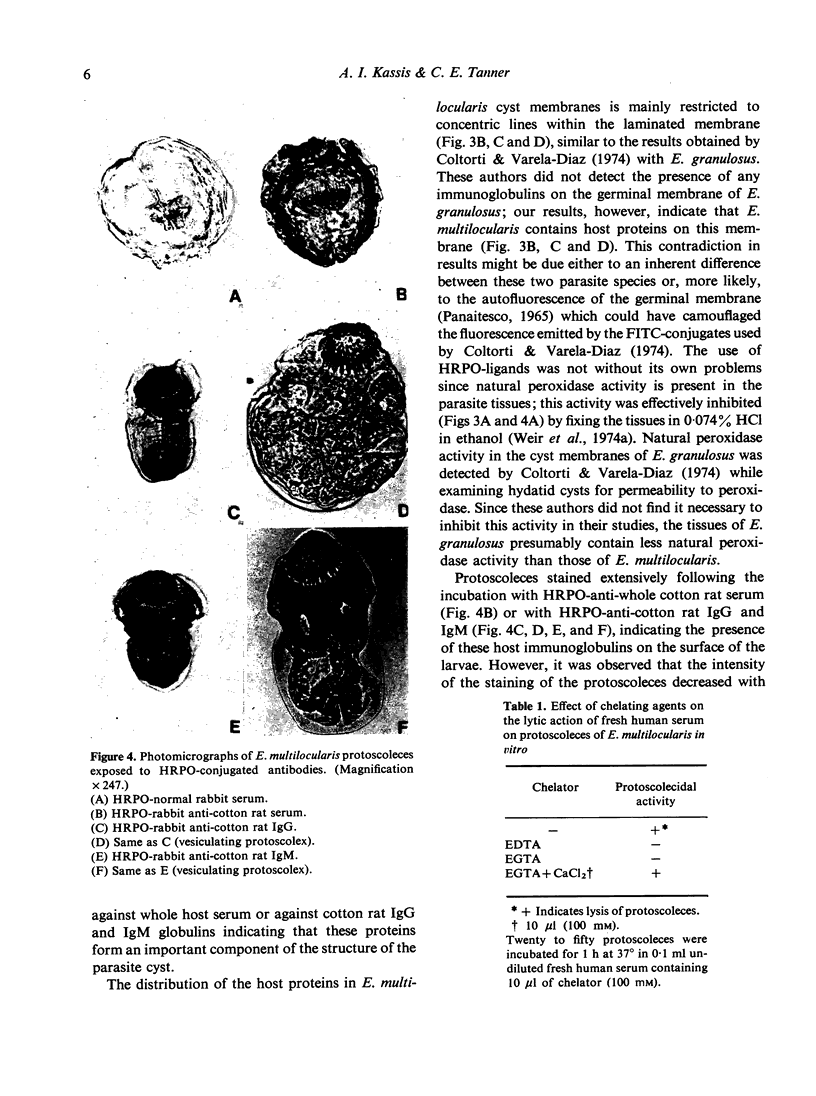
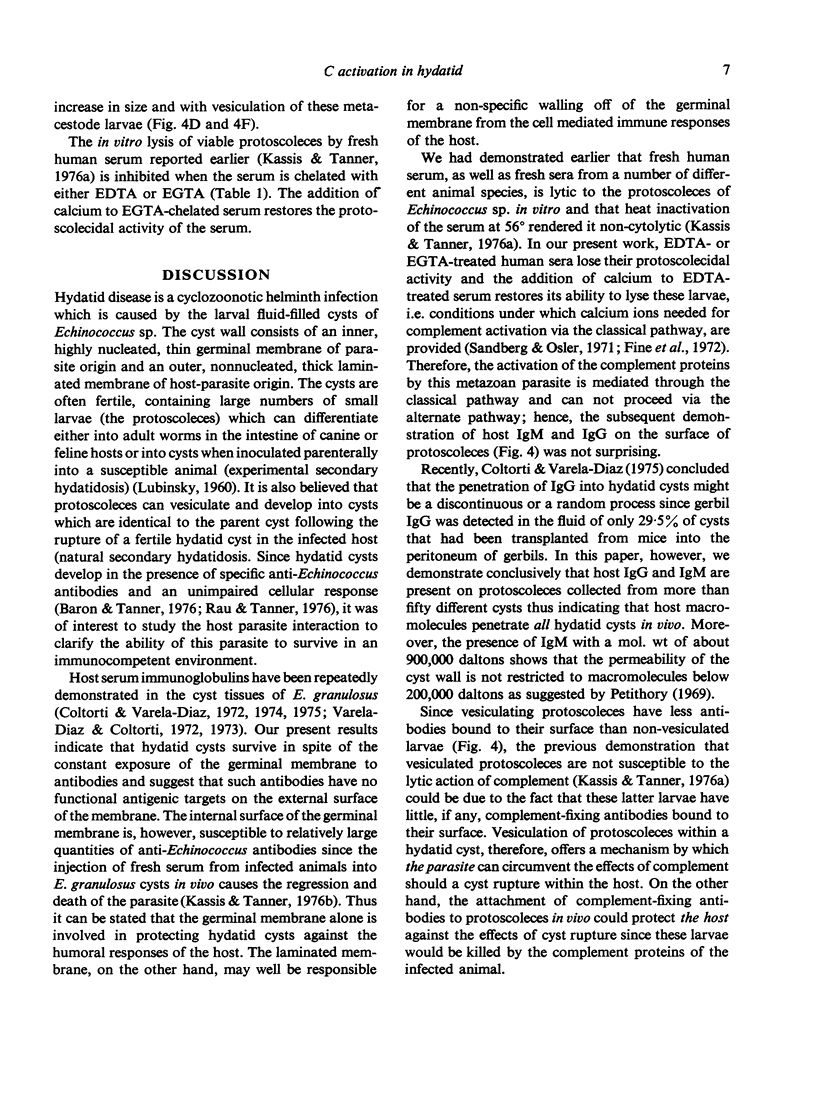
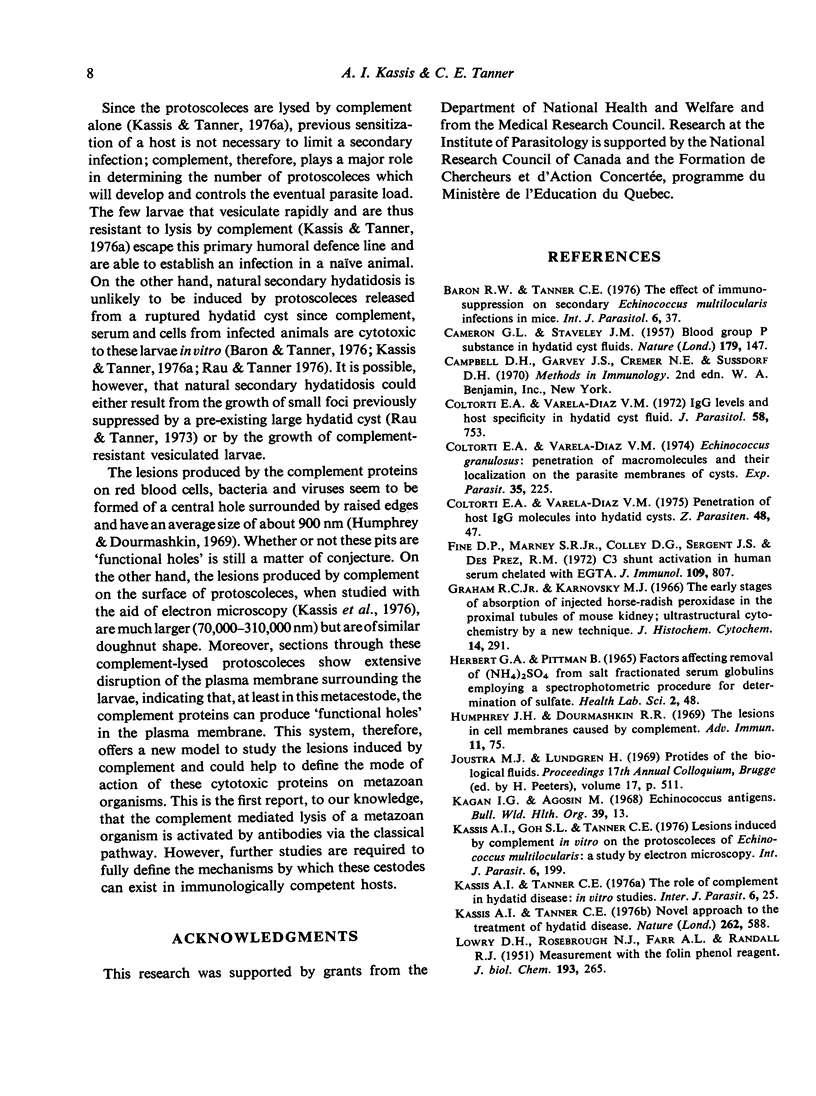
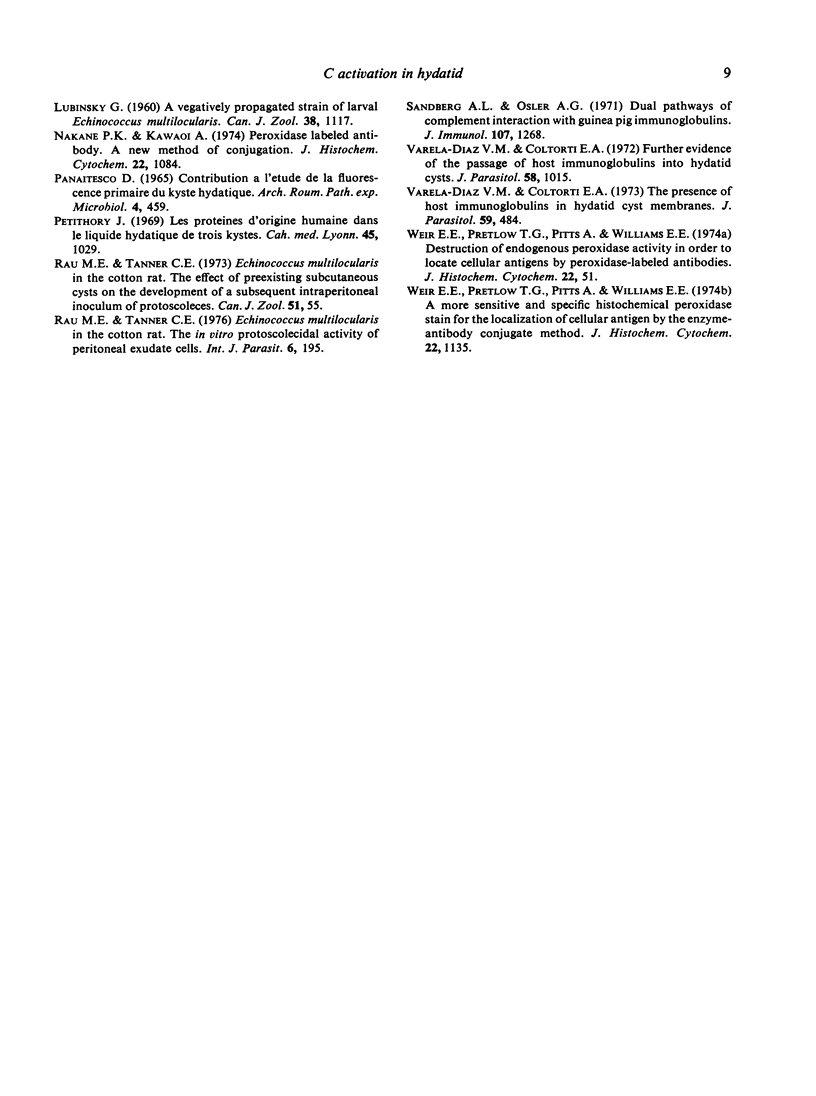
Images in this article
Selected References
These references are in PubMed. This may not be the complete list of references from this article.
- Baron R. W., Tanner C. E. The effect of immunosuppression on secondary Echinococcus multilocularis infections in mice. Int J Parasitol. 1976 Feb;6(1):37–42. doi: 10.1016/0020-7519(76)90008-4. [DOI] [PubMed] [Google Scholar]
- CAMERON G. L., STAVELEY J. M. Blood group P substance in hydatid cyst fluids. Nature. 1957 Jan 19;179(4551):147–148. doi: 10.1038/179147a0. [DOI] [PubMed] [Google Scholar]
- Coltorii E. A., Varela-Díaz V. M. Echinococcus granulosus: penetration of macromolecules and their localization on the parasite membranes of cysts. Exp Parasitol. 1974 Apr;35(2):225–231. doi: 10.1016/0014-4894(74)90026-5. [DOI] [PubMed] [Google Scholar]
- Coltorti E. A., Varela-Díaz V. M. IgG levels and host specificity in hydatid cyst fluid. J Parasitol. 1972 Aug;58(4):753–756. [PubMed] [Google Scholar]
- Coltorti E. A., Varela-Díaz V. M. Penetration of host IgG molecules into hydatid cysts. Z Parasitenkd. 1975 Dec 11;48(1):47–51. doi: 10.1007/BF00389828. [DOI] [PubMed] [Google Scholar]
- Fine D. P., Marney S. R., Jr, Colley D. G., Sergent J. S., Des Prez R. M. C3 shunt activation in human serum chelated with EGTA. J Immunol. 1972 Oct;109(4):807–809. [PubMed] [Google Scholar]
- Graham R. C., Jr, Karnovsky M. J. The early stages of absorption of injected horseradish peroxidase in the proximal tubules of mouse kidney: ultrastructural cytochemistry by a new technique. J Histochem Cytochem. 1966 Apr;14(4):291–302. doi: 10.1177/14.4.291. [DOI] [PubMed] [Google Scholar]
- HEBERT G. A., PITTMAN B. FACTORS AFFECTING REMOVAL OF (NH4)2SO4 FROM SALT FRACTIONATED SERUM GLOBULINS EMPLOYING A SPECTROPHOTMETRIC PROCEDURE FOR DETERMINATION OF SULFATE. Health Lab Sci. 1965 Jan;2:48–53. [PubMed] [Google Scholar]
- Humphrey J. H., Dourmashkin R. R. The lesions in cell membranes caused by complement. Adv Immunol. 1969;11:75–115. doi: 10.1016/s0065-2776(08)60478-2. [DOI] [PubMed] [Google Scholar]
- Kagan I. G., Agosin M. Echinococcus antigens. Bull World Health Organ. 1968;39(1):13–24. [PMC free article] [PubMed] [Google Scholar]
- Kassis A. I., Goh S. L., Tanner C. E. Lesions induced by complement in vitro on the protoscoleces of Echinococcus multilocularis: a study by electron microscopy. Int J Parasitol. 1976 Jun;6(3):199–211. doi: 10.1016/0020-7519(76)90035-7. [DOI] [PubMed] [Google Scholar]
- Kassis A. I., Tanner C. E. Novel approach to the treatment of hydatid disease. Nature. 1976 Aug 12;262(5569):588–589. doi: 10.1038/262588a0. [DOI] [PubMed] [Google Scholar]
- LOWRY O. H., ROSEBROUGH N. J., FARR A. L., RANDALL R. J. Protein measurement with the Folin phenol reagent. J Biol Chem. 1951 Nov;193(1):265–275. [PubMed] [Google Scholar]
- Nakane P. K., Kawaoi A. Peroxidase-labeled antibody. A new method of conjugation. J Histochem Cytochem. 1974 Dec;22(12):1084–1091. doi: 10.1177/22.12.1084. [DOI] [PubMed] [Google Scholar]
- Panaitesco D. Contribution à l'etude de la fluorescence primaire du kyste hydatique. Arch Roum Pathol Exp Microbiol. 1965 Jun;24(2):459–466. [PubMed] [Google Scholar]
- Pitts A., Williams E. E. Letter: Destruction of endogenous peroxidase activity in order to locate cellular antigens by peroxidase-labeled antibodies. J Histochem Cytochem. 1974 Jan;22(1):51–54. doi: 10.1177/22.1.51. [DOI] [PubMed] [Google Scholar]
- Rau M. E., Tanner C. E. Echinococcus multilocularis in the cotton rat. The effect of preexisting subcutaneous cysts on the development of a subsequent intraperitoneal inoculum of protoscolices. Can J Zool. 1973 Jan;51(1):55–59. doi: 10.1139/z73-009. [DOI] [PubMed] [Google Scholar]
- Rau M. E., Tanner C. E. Echinococcus multilocularis in the cotton rat: the in vitro protoscolicidal activity of peritoneal cells. Int J Parasitol. 1976 Jun;6(3):195–198. doi: 10.1016/0020-7519(76)90034-5. [DOI] [PubMed] [Google Scholar]
- Sandberg A. L., Osler A. G. Dual pathways of complement interaction with guinea pig immunoglobulins. J Immunol. 1971 Nov;107(5):1268–1273. [PubMed] [Google Scholar]
- Varela-Diaz V. M., Coltorti E. A. The presence of host immunoglobulins in hydatid cyst membranes. J Parasitol. 1973 Jun;59(3):484–488. [PubMed] [Google Scholar]
- Varela-Díaz V. M., Coltorti E. A. Further evidence of the passage of host immunoglobulins into hydatid cysts. J Parasitol. 1972 Oct;58(5):1015–1016. [PubMed] [Google Scholar]
- Weir E. E., Pretlow T. G., Pitts A., Williams E. E. A more sensitive and specific histochemical peroxidase stain for the localization of cellular antigen by the enzyme-antibody conjugate method. J Histochem Cytochem. 1974 Dec;22(12):1135–1140. doi: 10.1177/22.12.1135. [DOI] [PubMed] [Google Scholar]



